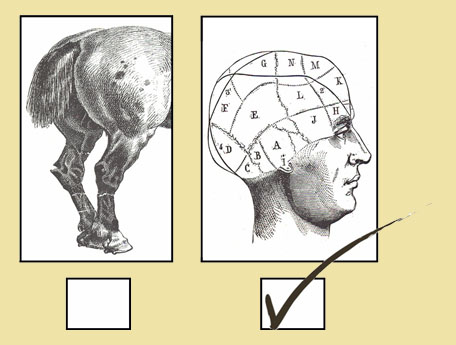![]()
Forty Years Later with two Old Testament Dudes
On Dewey Whitwell's Knee, I Consider My Second Amendment Rights
![]()

"Jan Worth published her great novel Nightblind herself (with iUniverse) and thank goodness she did. She worked on it for about thirty years she says in the Acknowledgements.
Worth’s book is splendid and delightful, wise and witty and rich. Twenty times better, say, than something like Eat, Pray, Love...." (Read the full review...)
![]()

Essays > The World's Skeptical of Smartypants

I loved sixth grade. My teacher, Howard Linz, was the first male teacher I’d ever had, and he was charming – a robust, charismatic character with horn-rimmed glasses who looked a lot like Clark Kent.
That year we studied ancient cultures, and Mr. Linz loved getting us all to shout out BAB-Y-LON-I-A in unison at the start of history class. He just loved how that word sounded.
We built little ancient villages with oatmeal boxes and toothpicks. We had a Toastmaster’s Club during lunch hour where I learned to think on my feet and be entertaining. He made a game out of math class and even I, for whom numbers were never natural, dug deep and developed gusto for fast and public calculations.
In Mr. Linz’s class, it was “in” to be smart. It was fun and energizing and we all thought we were the greatest kids in the world.
It was also psychologically complicated. Mr. Linz’s sixth grade was part of a gifted program in the Ohio public schools, and we “smart kids,” of the Baby Boom who’d been selected for special treatment in the heady Fifties, when the country still valued education, were warned repeatedly that being intelligent wouldn’t necessarily make life easier.
“Don’t think you’ll just get what you want because you’re smart,” Mr. Linz told us. “Don’t think being smart gives you a pass to laziness. You still have to work hard.”
And not only that, Mr. Linz asserted, some people might even hold our smarts against us.
That didn’t come as a surprise. Most of us had already been teased and bullied, nagged away from showing off. My situation was complicated at home, where my older sister had been labeled a “slow learner.” While I gloried in fancy vocabulary and field trips to museums at airy Belle Stone School, my sister wove mismatched doilies in the dreary halls of Horace Mann. While I thrived in English and garnered praise from teachers for verbal precocity, my sister suffered a terrible bout of acne and could never solve how to multiply.
“Don’t you ever act like you’re better than she is,” my mother scolded, “because you’re not.”
Being smart – so exhilarating at school – thus came with a cost. I learned I was supposed to downplay it and never, ever take pride in this thing I naturally came by. Like my sister’s “retardation,” my intelligence was explained to me as an accident. In the genetic lottery I lucked out.
So I felt a little guilty and apologetic when a word like “voluptuous” or “elucidate” escaped my pre-teen lips, setting me apart from my less-verbal peers. I’d done nothing to deserve this “difference.” I didn’t mean to be a show-off.
But whether I was supposed to take pride in it or not, I had a secret: I loved my unearned gift. Even now I am grateful for the lucky bequest of whatever brains I’ve got. Mr. Linz probably would smile if he heard me say I know it takes a lifetime to learn to use a decent brain for good.
It has not made me rich. It did not save my first marriage or guarantee a clean colonoscopy. It has not sent me up the hierarchy to prestige or power; in fact, I’m convinced it has stood in the way, when bosses found me slightly uppity and flatly unimpressed by dopey schemes.
But I have enjoyed my brain and used it nonetheless. I have used it to help my sister. I use it to teach my students. I have used it to write love letters and poems and a book and this column.
So here’s my point: I think smart is good. It’s time for the country to dump its bone-headed anti-elitism. I want a world that welcomes brains.
When obstreperously doodle-brained Mayor Don Williamson fired Kay Kelly, I suspect it might have been because she was just a little too smart for The Don’s comfort zone.
When people in response to the Kelly firing dissed “The East Court crowd” for coming to her defense, I wondered if it might be because in part the pods of vocal liberals hanging out on our tree-lined streets might be seen as arrogant: just the kind of smartalecks my mother warned me not to be.
When endearingly brainy mayoral candidate Dayne Walling lost by 300 votes in the last election, local pundits suggested our hometown-boy- turned-Rhodes-Scholar was just too smart to win the public trust.
When national campaigners disdain a candidate for having a Harvard degree, I sink into a gloomy swamp.
With looming meltdowns on every front, it seems to me that this is just the time for an egghead with heart – for somebody who not only handles complications well but also thrives on them. And not just one egghead. We could use a dozen quick-wits, a peck of sages, a bushel of brainiacs. Smart people might actually be able to help fix the world. What if we promise to dig in to solving problems, all showboating aside, in all humility? Couldn’t it be a great thing to have bright, well-educated and reasonable people at the helm?



















